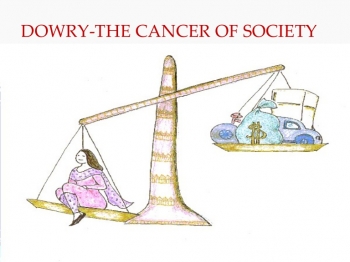
.jpg) IC Correspondent
IC Correspondent

Each time one sees the smiling face of Vismaya Nair on the pages of newspapers or the television screens, a deep pang of guilt runs through the spine of all those with a conscience. The young woman, from Kerala, died with all her dreams – of living happily ever after marrying a handsome person, becoming a doctor and getting all the happiness in the world – unrealized.
The 24-year-old Vismaya was no ordinary woman. She was studying in the last year of her course to become an Ayurvedic doctor. She had shared the stories of her torture at the hands of an abusive husband Kiran Kumar and sent her family members pictures of bruises and injuries, including one received after he stomped on her face. Kiran Kumar may have other psychological reasons to be violent to his wife, but he told her plainly that he deserved a better car and more dowry from her parents.
One wonders why her parents never thought of rescuing their daughter from the clutches of a greedy and violent man.
Her death has broken the common myth that dowry deaths are more common in North India and the progressive South and especially fully-literate Kerala is immune to this menace. In fact, Vismaya’s parents had gifted Kiran Kumar a car worth Rs 11 lakhs, 1.5 acres of land and 100 sovereigns of gold.
If society starts accepting the ‘groom price’ or dowry as a new normal, then there is no end to the demands. Vismaya became a victim of expectations of her husband; he thought of himself as a superior being to her and, therefore, deserved more.
We must feel guilty because, as a society, we have not revolted against ‘groom price’ and are treating our girls rather uncharitably. Mothers continue to preach to their daughters the virtues of tolerance, making more adjustments and not letting down their matrimonial family. They should instead be taught to keep their heads high and being respected by their husbands’ families.
Close to Vismaya’s suspected suicide, apparently due to harassment for dowry and domestic violence, two more similar cases were reported – one of a 19-year-old Suchithra from Kollam and another of 24-year-old Jyotishri from Tamil Nadu.
Both had faced situations like Vismaya’s and taken their own lives under pressure for getting insufficient dowry.
The giving and taking of dowry was abolished by the law way back in 1961. However, the tradition has only become stronger with each passing year; it’s becoming a status symbol. Unfortunately, the more one spends on dowry to please the family or the groom, the more they devalue the human being that their daughter is. With people gaining prosperity, the concept of giving gifts or ‘streedhan’ to a woman as their rightful share in their parents’ wealth has vanished.
Some grooms and their families find the wedding as a get-rich-quickly scheme; there are parents who go to any length to fulfill their demands for material wealth.
Recently, a PhD scholar committed suicide because her in-laws were not okay with her continuing studies; an aviation professional jumped off her terrace after she was tortured emotionally for dowry by her husband and his family.
According to the National Crime Records Bureau, an alarming number of 20 women die every day in India either after being murdered or forced to take their own lives over unfulfilled dowry demands.
In 2017, India recorded nearly 7,000 dowry-related deaths. The dowry deaths rose from about 19 per day in 2001 to 21 per day in 2016. Interestingly, the NCRB data is about the reported cases; there must be an equal number of unreported cases of women’s deaths for dowry.
Why is the system of dowry not ending? There are mainly two key reasons for this. One is the patriarchy where men are seen as far superior to women in all possible ways. This is an irony in a country where the majority religion – Hinduism -- believes in Goddess, the omnipotent female celestial power and where people as a matter of faith believe that every woman is an incarnation of the Goddess. In the growth of human evolution, somewhere the gender equations have got distorted and society had perpetuated this system.
Secondly, the feudal mindset doesn’t allow them to see their adult children as independent human beings. South Asia, most probably, is the only region in the world where adults have to look towards their parents for selecting and approving a spouse for them. There is a proposal before the Law Commission that seeks to ban the parents from taking charge of their adult children’s wedding. It seeks to ban parents from inviting people to their children’s wedding.
Instead of adults choosing their own partners, many societies in India frown upon such relations. The reason is that many parents still see the wedding arrangements and dowry as a status symbol. There are reports about farmers taking huge agriculture loans from banks to spend on lavish weddings and dowry of their daughters and then ending their lives when they are unable to repay the loans.
Somewhere this vicious cycle needs to be broken and the system of ‘groom money’ has to come to an end. There is an urgent need to de-commercialise weddings and implement equal inheritance rights of women.